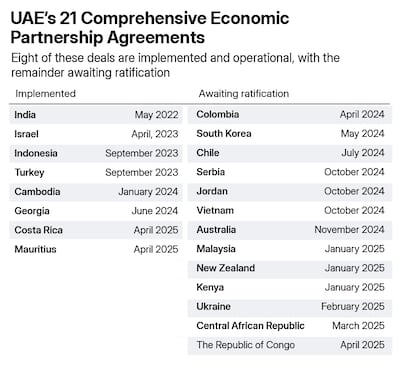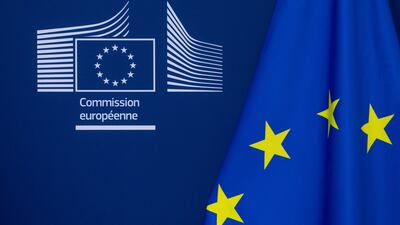The UAE’s move to seek a potential trade deal with the EU solidifies the country's credentials as a globally competitive trading hub and a destination for foreign direct investment, according to economists.
A Comprehensive Economic Partnership Agreement between the UAE, the Arab world's second-largest economy, and the 27-member economic bloc will be a significant milestone at a time of rising global uncertainties, benefiting several sectors, said Monica Malik, chief economist at Abu Dhabi Commercial Bank.
“The EU is a significant trading partner for the UAE and an agreement would further support export opportunities into the bloc, while supporting cheaper imports," she said. "We would expect greater investment in areas from clean energy, transportation and logistics, and manufacturing, to highlight a few.”
Trade treaties signed by the UAE do not only support the expansion in key non-oil sectors, such as trade and logistics, but they also bolster the UAE's economic diversification agenda, Ms Malik added.

The UAE and the EU have agreed to begin talks on a potential trade deal, UAE President Sheikh Mohamed announced on Thursday evening. The talks will focus on trade in goods, services, investment and deepening co-operation in strategic sectors, including renewable energy, green hydrogen and critical raw materials, the EU said in a separate statement.
By reducing tariffs and unnecessary trade barriers and improving market access for goods and services, the pact is expected to foster opportunities in key sectors including advanced manufacturing, health care, logistics and artificial intelligence, the UAE’s state news agency Wam reported.
The plans for talks to deepen trade ties come after US President Donald Trump's push to slap tariffs on some of his country's biggest trading partners. While Washington has paused some of the sweeping duties on imports from around the world, it raised levies on China to 145 per cent, stoking fears of a trade war that will dent global economic growth.
The announcement of EU-UAE trade talks is "timely", as there is greater global fragmentation and decoupling with China, in general, said Nasser Saidi, a former economy minister in Lebanon and vice governor of its central bank.
"It is in the economic and financial interest of the UAE and the GCC to expand and deepen relations with the EU, given the latter's growing trade and investment confrontation with the US," he said. "As the US imposes tariffs on the EU, the bloc has to diversify and divert to other markets.
"For the UAE, this provides a perfect opportunity to further open up and strengthen its trade and investment linkages with the EU."
The bottom line is that a policy of continued openness and liberalisation by the UAE will be beneficial at a time when other countries are moving towards more trade barriers and increased protectionism, Mr Saidi added.
Push for trade deals
Since the Covid-19 pandemic, the UAE has struck a series of trade agreements, referred to as Cepa deals, to boost trade and investment ties with its partners around the globe. A deal with the EU would be the largest since the UAE signed a Cepa with India in February 2022.
The UAE launched the Cepa programme in 2021 to reduce tariffs and remove trade bottlenecks through simpler customs procedures and rules. The agreements are also expected to boost bilateral investment in priority areas.
The programme helped the UAE hit record non-oil trade in 2024 of $816.7 billion, marking a 14.6 per cent annual increase. The country seeks to increase its foreign trade to Dh4 trillion ($1.1 trillion) by 2031.
“The UAE-EU FTA discussions are a continuation of the UAE’s strategy to integrate in the global economy and are notable given the EU’s size and already strong links with the Emirates,” said Scott Livermore, chief economist for the Middle East and North Africa at Oxford Economics.
“An FTA is likely to offer significant opportunities to businesses based in the UAE to attract new investment, but there will also be significant investment opportunities in the EU.”
“Trade deals with the EU typically have more conditions attached and negotiations are likely to be more drawn out than we have seen with the recent raft of Cepas that the UAE has agreed,” Mr Livermore added.
Krishnan Ramachandran, chief executive of Barjeel Geojit Financial Services, said there were several stages to trade deal negotiations. The complexity and duration vary, but such agreements typically take several months to finalise, depending on the scope and the political will of the parties involved, he added.
"While it's challenging to predict exact timelines, considering the stages involved and the commitment from both parties, the Cepa could potentially be finalised within the next nine to 12 months," he said.
Second-largest trading partner
The EU is the UAE’s second-largest global trade partner after China, sharing $67.6 billion in non-oil trade in 2024, according to a fact sheet from the UAE's Ministry of Foreign Affairs. The EU now accounts for 8.3 per cent of the UAE’s total non-oil foreign trade.
The Emirates is also the bloc's largest export destination and investment partner in the Middle East and North Africa, Wam added on Thursday.
Top exports from the UAE to the EU include fuels and precious metals, as well as aluminium and plastics – providing inputs for Europe's industry and manufacturing, Mr Saidi said.
The top imports from the EU to the UAE are machinery, mechanical appliances and electrical equipment, "both essential to facilitate the UAE's ambition to emerge as a leading manufacturing and industrial hub", he said.
Beyond the remit of trade in goods, the Cepa with the UAE will allow EU countries to increase trade in services, including tourism, with collaboration in key areas such as artificial intelligence, renewable energy, climate technology and climate finance, as well as financial services and capital markets, he added.
"Existing EU-Middle East air travel routes could be strengthened further with a fully deregulated open skies policy in a bid to increase both passenger and cargo movements," he estimated.
At a time of rising economic uncertainty relating to trade, Mr Saidi suggested the UAE and EU could also explore options to sign swap agreements between the European Central Bank and the UAE Central Bank, strengthen payment networks and complete trade transactions in euros and/or using digital currency.
The UAE has Cepa deals with 21 countries. The most recent was signed with the Republic of the Congo this week.
Eight of these deals – with India, Indonesia, Israel, Turkey, Cambodia, Georgia, Costa Rica and Mauritius – are currently implemented and operational, according to data provided by the Ministry of Economy.
Agreements with the remaining 13 countries, Jordan, Australia, South Korea, Malaysia, New Zealand, Chile, Colombia, Kenya, Serbia, Ukraine, Vietnam, the Central African Republic and the Republic of the Congo, are awaiting ratification.
The deals with countries including India and Turkey have helped the UAE to boost its trade. The UAE's non-oil trade with India grew by 20.5 per cent year-on-year to Dh240.3 billion and with Turkey by 11.5 per cent on an annual basis to Dh148.9 billion last year, Dr Thani Al Zeyoudi, Minister of State for Foreign Trade, said previously.
Trade deals are expected to add at least 2.6 per cent to the UAE's economy by 2030, creating thousands of jobs and supporting its vision to diversify the economy away from oil and gas.



